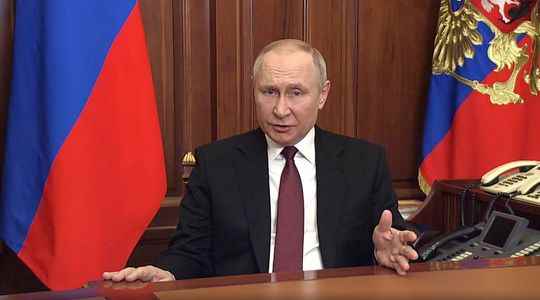Not knowing what to do for Ukraine, with Ukraine, about Ukraine, in desperate solidarity, I watch on Arte The Servant of the People, the first TV series in history having resulted in the election of an actor to the presidency of a democratic republic, a brilliant prefiguration of a mandate which was to provoke the third world war. And why not destroy the planet.
I’ve wanted to do it for a fortnight, but there are 23 episodes, almost nine hours of screen time for the first season, and at the same time I have to finish writing my book on Léon Daudet, tell how the suicide of his son prevented him from becoming the Mussolini he dreamed of being, the Hitler of France to the French. In fact, I find myself in the same story, the fate of Volodymyr Zelensky proving that Marx was wrong, not only does history repeat itself, but the first time is a comedy series, the second is the real one tragic life.
1938, Europe paralyzed by the rise of Nazism: “Hitler can’t take responsibility for starting a second world war, that’s not possible, not twenty years after Verdun! And then his thing with the Jews, that’s not It’s not serious, it’s rhetorical. He can’t kill them all.”
2018, the same Europe, even paralyzed by the rise of Putinism: “The Americans are exaggerating, they are doing the trick to us in Iraq with weapons of mass destruction. Let’s not provoke this bear.” From one era to another the same enigma: is it possible that a single man can decide the fate of the universe, with the jubilation that his loss visibly inspires in him?
Twenty years to train a people for the joys of war
Twenty years is the time that separates the Armistice from the Anschluss. And that separates the rise of Putin from the invasion of Ukraine. Twenty years to train a people for the joys of war. Are today’s Russians better than yesterday’s Germans? I don’t say “all Russians”, nor do I say “all Germans”. And the French of 1940 are far from worth the Ukrainians of today. I have no doubt that there are at this moment, between Moscow and kyiv, writers who are trying, as in their time Romain Rolland and Stefan Zweig, to overcome their own patriotic hatred. But from what percentage of voters does it start, “a people united behind its leader”? And when do they end up being crushed, exterminated, the ultra-minorities?
When the Berlin Wall fell, I thought it was over, I went to Russia to shoot a film. Two Frenchmen, two Russians in an old rented car stuffed with cinema equipment, happiness in its purest form. On the road to the old Leningrad, 200 kilometers from Moscow, we get arrested by the police: “Papers!” We didn’t have them. No passport or permit, nothing. An oversight due to yesterday’s vodka, probably. What do you think happened? The cop, jeering, let us go. And without bribe. Long live France. Long live Gorbachev. That’s not what made me love Russia, I loved it before and I will always love it, with the Russians who are in my film, incurably nostalgic, the children sang Patricia Kaas, the old people recited of Pushkin. We won’t always have that. Music, literature, cinema…
In the sixth episode of servant of the people, President Goloborodko, played by Volodymyr Zelensky, has disappeared. We think he was kidnapped. In fact, he returned to his classroom to give a history lesson to his students. At the end of his presentation, he quotes Piotr Stolypin, the Russian Prime Minister, who would have said in the face of the revolutionary socialist Dmitry Bogrov who was pointing his revolver at him: “If you want to shoot me, go ahead. But know that I am happy to die for my tsar.” It was September 1, 1911, Bogrov fired twice, and Stolypin died four days later, as Zelensky tells his students.
